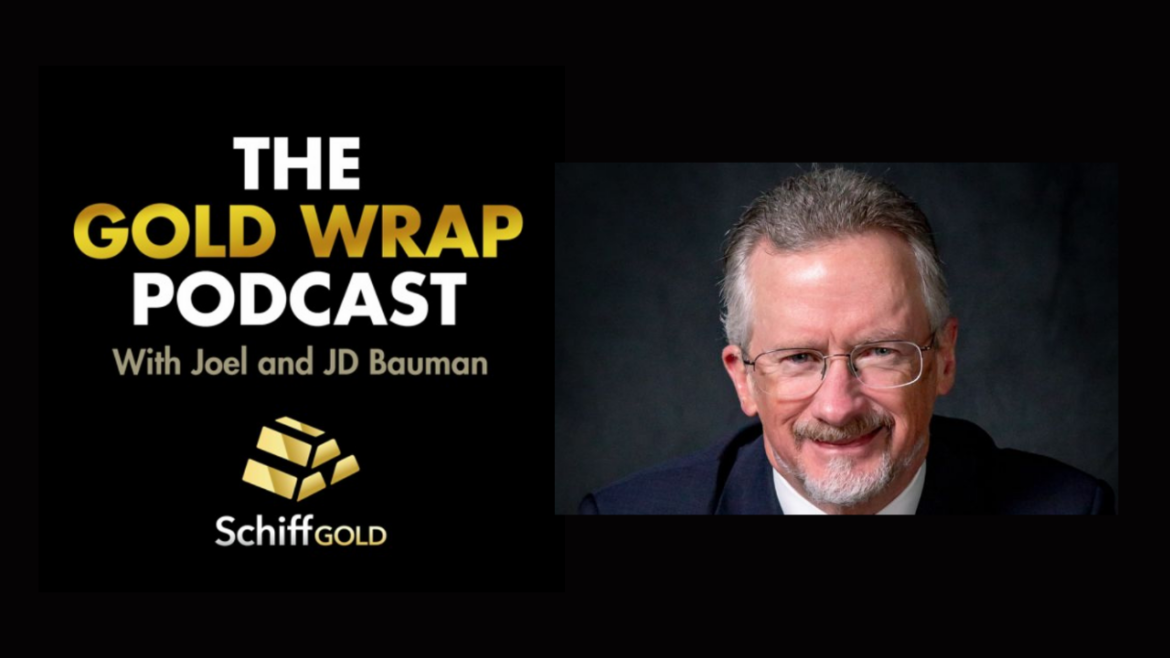Precious metals are apparently waking up. And here is where you can find the best deals.
Site:
Precious metals news
Apr 19, 2024 - 12:04:27 EDT
The psychology of inflation plays a significant role because it impacts individuals differently based on their personal circumstances. For homeowners with fixed mortgage rates and minimal debt, inflation may pose little threat to their financial stability. However, for renters, prospective homebuyers, or those needing to purchase big-ticket items or borrow money, inflation can be severely detrimental. This disparity in experiences contributes to widespread skepticism about official inflation figures, as people feel the impacts of inflation vary greatly from what is reported by the government.
In his latest article on MetalsDaily.com, Ross Norman highlights the significant purchasing trends on the Shanghai Futures Exchange (SHFE), which offer a glimpse into China's unique perspective on gold. Unlike the prevailing global view, China exhibits a distinct cognitive bias favoring gold, a stance not mirrored by weaker demand in other regions at current price levels. This discrepancy may stem from what's known as "false consensus bias," where people mistakenly believe others share their views. Norman's analysis suggests that understanding China's distinct market behavior is crucial for interpreting global gold trends.
After a significant rally, U.S. Treasuries have pared their gains following a de-escalation in Middle East tensions, which refocused attention on inflation expectations. The 10-year U.S. government bond yields dropped slightly by five basis points to 4.59%, nearly reversing an earlier 14 basis point decline. This change occurred after a senior Iranian official indicated that Iran would not immediately retaliate against Israel, easing fears of further conflict escalation. Despite this recent volatility reducing the impact of this year’s earlier sell-off, the 10-year Treasury is on track for a fourth consecutive week of losses. Investors are now anticipating a more gradual approach to monetary easing, reflected in the nearly one percentage point increase in bond yields from their late 2023 low, reaching levels last seen in November.
America’s trust in its institutions has rapidly eroded over the past 20 years. We have a lower level of trust in our judicial system and elections than most European countries. Some of this is natural, as Americans are uniquely individualistic, but much of it arises from repeated government failures.
Global central bankers are increasingly concerned about the Middle East's volatility and its potential to disrupt their efforts to control inflation. This anxiety was heightened when an Israeli attack on Iran caused crude oil prices to spike by more than 4%, surpassing $90 a barrel, although prices later stabilized somewhat. The incident underscores the delicate balance central bankers must maintain amidst geopolitical tensions that could reignite inflationary pressures. These developments come as world leaders, including UN Secretary-General Antonio Guterres, warn of the region's instability, and as top diplomats from the Group of Seven discuss global threats in Italy, all coinciding with the International Monetary Fund meetings in Washington where the economic implications of these geopolitical tensions are a focal point.
During President Joe Biden's campaign tour in Pennsylvania, he praised the U.S. economy as the strongest globally, but international financial leaders meeting in Washington for the IMF-World Bank spring meetings voiced concerns. They urged moderation, highlighting how the robust U.S. economy, characterized by high interest rates and a strong dollar, has negatively impacted other countries by devaluing their currencies and complicating efforts to reduce borrowing costs. These sentiments were underscored by Federal Reserve Chair Jerome Powell, who announced that expected rate cuts would be delayed due to persistent high U.S. inflation.
Gold prices continued their upward trend, marking a fifth consecutive week of gains as investors sought refuge in the safe-haven asset amid escalating Middle East tensions between Iran and Israel. On Friday, spot gold increased by 0.1% to $2,380.68 per ounce and had earlier reached up to $2,417.59. The overall gain for the week was over 1%. U.S. gold futures also saw a rise of 0.1%, standing at $2,396.60. Tensions heightened following reported explosions in an Iranian city, attributed to an Israeli attack, although Iran downplayed the incident, suggesting no immediate retaliation. Analyst Peter Fertig highlighted that these geopolitical uncertainties are bolstering gold's status as a safe-haven investment.
 Top Hillsdale Economist Warns of US Default: SchiffGold Friday Gold Wrap April 19, 2024
Top Hillsdale Economist Warns of US Default: SchiffGold Friday Gold Wrap April 19, 2024April 19, 2024
JD and Joel interview Dr. Charles Steele, Chairman of Economics, Business, and Accounting, at Hillsdale College. We discuss national debt, dollar default, Austrian economics, Von Mises, green energy bills, and space economics.
 Top Hillsdale Economist Warns of US Default: SchiffGold Friday Gold Wrap April 12, 2024
Top Hillsdale Economist Warns of US Default: SchiffGold Friday Gold Wrap April 12, 2024April 19, 2024
JD and Joel interview Dr. Charles Steele, Chairman of Economics, Business, and Accounting, at Hillsdale College. We discuss national debt, dollar default, Austrian economics, Von Mises, green energy bills, and space economics.
Federal Reserve Chair Jerome Powell has indicated that due to persistently high inflation, anticipated interest rate cuts might be postponed to later this year, potentially maintaining higher rates for an extended period. Speaking at the Wilson Center, Powell expressed concerns that recent data do not confirm inflation is under control and hinted it may take longer than previously expected to stabilize. He emphasized that if high inflation continues, the Fed is prepared to keep interest rates elevated as necessary. This stance suggests that the Fed might implement fewer rate reductions than the three quarter-point cuts previously forecasted in March.
The economy might be booming, but housing is in a recession: Top real estate CEO says he’s never seen anything like it in 20 years...
Apr 18, 2024 - 14:01:43 EDT
The Silver Institute's annual World Silver Survey, conducted by UK-based Metals Focus, projects the silver market it to experience its second-largest deficit in two decades in 2024. This forecast is driven by a record 9% increase in industrial demand, expected to reach 710.9 million ounces, with the solar sector playing a crucial role. Demand for silver in photovoltaic (PV) solar panels alone is anticipated to surge by 20% to 232 million ounces. As a result, robust demand continues to surpass supply, supporting high silver prices and leading to a further depletion of above-ground stocks.
According to Bank of France Governor Villeroy, speaking to CNBC, the European Central Bank (ECB) should consider cutting interest rates in June, provided there are no major surprises. This statement aligns with recent signals from the ECB suggesting readiness for a rate cut due to a more confident outlook on the disinflationary trajectory in the euro area. Despite maintaining interest rates at record highs during its last five meetings, the ECB has indicated that diminishing inflation pressures might soon warrant a reduction in rates.
Apr 18, 2024 - 13:26:48 EDT
Gold prices have surged this year despite a shift in the typical market dynamics, according to investment expert Imaru Casanova. Traditionally, gold rallies have been driven by robust investment demand and rising gold-backed ETF holdings. However, since April 2022, these factors have been in decline, even though the market has seen strong performance since hitting lows in October 2022. This divergence from historical trends suggests that the current rally in gold prices might have different underpinnings than those observed in past trends, challenging the conventional understanding of what drives gold market movements.
There’s a lot of hype about Costco’s gold bar sales lately...what is it all about? Why are Costco selling gold and silver bars in the first place
The Silver Institute has released its 2024 World Silver Survey, continuing its tradition since 1990 of providing a detailed annual analysis of the global silver market. This report offers a comprehensive overview of the past year’s silver demand dynamics and supply sources. For over three decades, the World Silver Survey has served as a reliable resource, extensively cited by industry experts, government bodies, and media for insights into the silver market.
 U.S. Reinstates Oil Sanctions on Venezuela Amid Election Promise Failures
U.S. Reinstates Oil Sanctions on Venezuela Amid Election Promise FailuresApr 18, 2024 - 09:56:29 EDT
The Biden administration is set to reimpose oil sanctions on Venezuela due to President Nicolas Maduro's failure to fulfill election commitments. This decision comes as the U.S. opts not to renew a license that previously eased sanctions on Venezuela's oil sector. With the license expiring, the U.S. Treasury Department has issued a temporary 45-day license to allow companies to conclude their operations in Venezuela's oil and gas industry. This move follows threats by Washington to reinstate energy sanctions if Maduro did not honor the commitments that had initially led to a partial lifting of sanctions after a U.S.-backed election deal with the Venezuelan opposition. These sanctions were first introduced in 2019 by the Trump administration after Maduro's controversial re-election, which was not recognized by the U.S. and other Western nations.
The U.S. labor market continues to show strength as weekly jobless claims held steady at a low 212,000 for the week ending April 13, according to the Labor Department. This stability in unemployment filings indicates ongoing resilience in the job market, which, alongside persistent high inflation, is influencing expectations that the Federal Reserve might postpone interest rate cuts until September. Some economists are even skeptical about any rate cuts occurring this year. Rubeela Farooqi, chief U.S. economist at High Frequency Economics, noted that the labor market is likely to adjust through a slowdown in hiring rather than an increase in layoffs, suggesting continued economic stability without significant job losses.
 Morgan Stanley Predicts Continued Dominance of U.S. Dollar as Global Reserve Currency
Morgan Stanley Predicts Continued Dominance of U.S. Dollar as Global Reserve CurrencyApr 18, 2024 - 09:14:41 EDT
Morgan Stanley asserts that the U.S. dollar will maintain its status as the dominant global reserve currency, despite facing various challenges and potential rivals, notably the Chinese yuan. Recent geopolitical tensions, such as Russia's conflict in Ukraine and domestic issues like the U.S. debt ceiling debates, have raised questions about the dollar's supremacy. However, the dollar's extensive influence across numerous economic and financial areas continues to be a significant factor in its favor. While some nations may explore alternatives due to the U.S.'s fiscal outlook and its frequent use of economic sanctions, replacing the dollar proves to be a formidable challenge, according to Morgan Stanley's latest report.
 Crude Futures Decline as Israel Holds Back from Retaliating Against Iran
Crude Futures Decline as Israel Holds Back from Retaliating Against IranApr 18, 2024 - 09:08:48 EDT
U.S. crude oil prices dropped below $83 as tensions in the Middle East showed signs of easing, with Israel holding off on an immediate retaliation against Iran following last weekend's unprecedented air assault. This restraint has reduced fears of a major conflict in the region, leading to a decline in oil prices for the fourth consecutive day. The West Texas Intermediate contract for May fell to $82.34 a barrel, while June Brent futures decreased to $86.77 a barrel. This week, oil prices have decreased by 4%, as traders reduce the geopolitical risk premium that had escalated over the previous two weeks due to heightened hostilities triggered by an Israeli airstrike on an Iranian diplomatic site in Syria earlier in the month.






